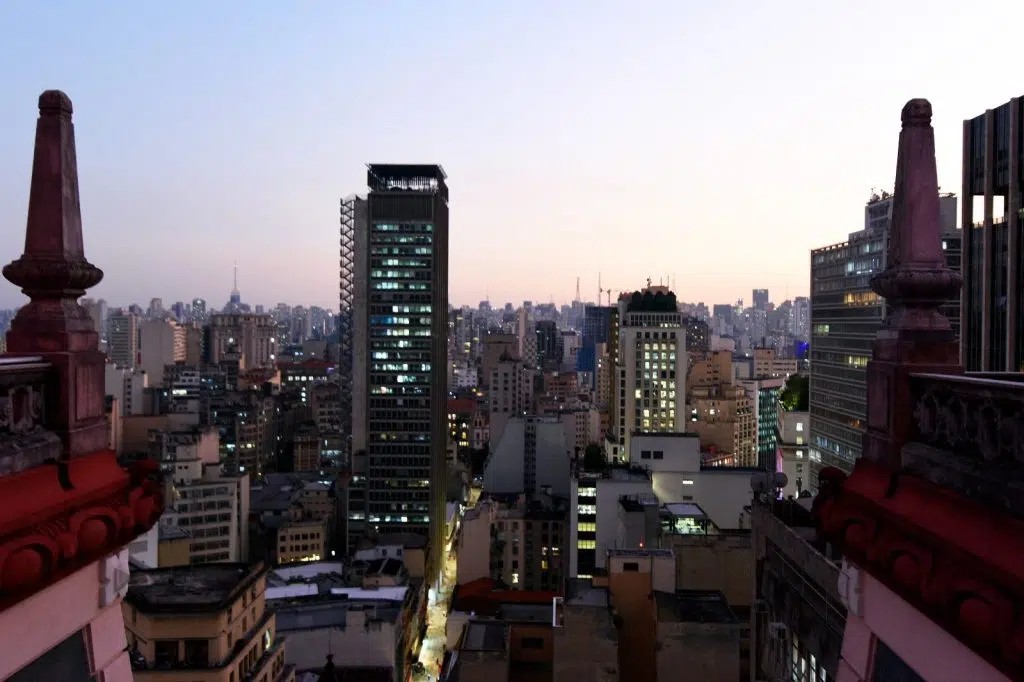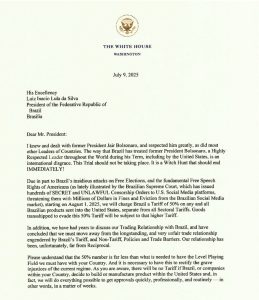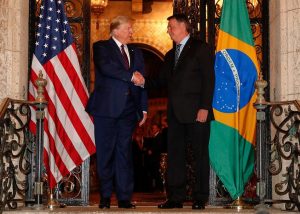
Trump Hurts Brazil Business Outlook
US president boosts chances of Lula re-election -- in bad news for investors.
BY LATINVEX EDITORS
Donald Trump’s threats to impose a 50% tariff on all imports from Brazil has sent shockwaves among investors and companies in Latin America’s largest economy, fearing billions of dollars in losses and hundreds of thousands of jobs lost.
Not only that, as a result, the chances of re-election for the country’s leftist president Luiz Inacio Lula da Silva has improved significantly, much to the dismay of the business community.
The US tariff threat of 50% would be the highest against any country except for Lesotho, which also faces a 50% tariff starting August 1, according to the Trump tariff tracker from Reed Smith.
Lula had been lagging all polls this year, as a result of growing economic pessimism. Yet, deeply nationalist Brazilians are now rallying behind him.
A new poll conducted by AtlasIntel for Bloomberg News shows that 50.3% of Brazilians view Trump’s move — which the US leader linked to legal proceedings against former President Jair Bolsonaro — as an attack on Brazil’s sovereignty and believe Lula’s administration is responding appropriately.
Approval for Lula’s government rose for the first time this year, a new poll showed on Wednesday, Reuters reports. The Quaest poll commissioned by brokerage Genial showed that 43% of those surveyed approve of Lula’s administration, up from 40% in the previous poll in May. Meanwhile, the government’s disapproval fell from 57% to 53% in the period.
Even worse, the poll shows that Lula would win a second-round vote against Sao Paulo Governor Tarcísio de Freitas, a moderate former infrastructure minister in the Bolsonaro administration. The poll gave Lula 41% against 37% for de Freitas, CNN Brasil reports.
Investors that had been optimistic about a change of government after the elections next year are now concerned, Valor Economico reports.
“With Lula potentially gaining momentum and the U.S. showing explicit support for Bolsonaro, Brazil’s election outlook has grown more complex,” Brendan McKenna, international economist at Wells Fargo, told the newspaper. “Political developments are now far more uncertain.”
In a letter to Lula, Trump justified the tariff threat because of the “witch hunt” against his ally, Bolsonaro, as well the treatment of US technology companies and what he called a “very unfair trade relationship” despite the fact that the United States actually has a $7.4 billion trade surplus with Brazil.

Letter sent by US President Donald Trump to Brazilian President Luiz Inacio Lula da Silva, announcing the threats of 50% tariffs.
The U.S. Chamber of Commerce and the American Chamber of Commerce in Brazil (AmCham Brazil) criticized the tariff plan.
“Imposing such measures in response to broader political tensions risks inflicting real harm on one of America’s most important economic relationships and sets a troubling precedent,” they said in a statement. “The proposed 50% tariff would impact products essential to U.S. supply chains and consumers, raising costs for households and reducing the competitiveness of key U.S. industries.”
More than 6,500 small businesses in the U.S. rely on products imported from Brazil while 3,900 American companies invest in the country and Brazil is a top 10 market for U.S. exports, and the destination of nearly $60 billion in U.S. goods and services every year, the chambers pointed out.
THE BOLSONARO FACTOR
Jair Bolsonaro, who was president of Brazil from 2019 to 2023, is facing trial over charges that he planned a coup that would have stopped Lula taking power despite the latter winning the 2022 elections. Brazil’s Office of the Attorney General has now requested the conviction of Bolsonaro and seven of his allies for allegedly attempting a coup, Valor Economico reports.

Brazil’s then-president Jair Bolsonaro (right) visits Donald Trump at Mar-a-Lago on March 7, 2020. (Photo: Alan Santos/Brazilian President’s Office)
The Brazilian Supreme Court in June agreed on details of a decision to hold social media companies liable for what their users post, ordering tech giants like Google, Meta and TikTok to actively monitor content that involves hate speech, racism and incitation to violence and act to remove it. (AP). Meanwhile, Trump Media and video platform Rumble filed a lawsuit in Florida against Brazilian Supreme Court Judge Alexandre de Moraes, accusing the Brazilian justice of censorship for ordering social media account suspensions, Valor Economico reported.
Trump’s tariff threat came in large part after lobbying by Bolsonaro’s son Eduardo, who has lived in the United States since early this year despite being a member of Brazil’s Congress.
Yet, three people close to the right-wing ex-president said they were stunned by the move and fear it may do more harm than good, Reuters reports.
Even Lula-critical media in Brazil have been harsh against Trump’s tariffs threats. “Trump’s crude blackmail will not pass,” said an editorial in O Globo newspaper.
And Brazil’s right-wing political groups are increasingly signaling, both publicly and behind the scenes, that they may head into the 2026 presidential election fractured, despite efforts by some of Jair Bolsonaro’s allies to unify around a single candidate, Valor Economico reports.
Freitas initially tried to blame the levies on Lula and rushed to Bolsonaro’s side. He recently also wore a “Make America Great Again” cap, earning a rebuke from the conservative newspaper O Estado de Sao Paulo. In and editorial titled “Mafia Stuff”, the paper said: “Wearing Trump’s cap today means aligning oneself with a troglodyte who could cause immense damage to the Brazilian economy.”
Freitas’ initial reaction was also strongly criticized by business leaders and he subsequently expressed support for Lula’s strategy against the Trump tariffs as well as attended a meeting with Sao Paulo-based exporters to discuss the impact of the US move.
After that meeting, Eduardo Bolsonaro said de Freitas suffered from a “slavish subservience to the elites.”
For Jair Bolsonaro, the tariffs undermine one of his key selling points of being a nationalist, defending Brazilian interests. The tariffs will clearly hurt Brazilian industry and agriculture (a key Bolsonaro group) as well as ordinary Brazilians impacted by job losses and potentially more expensive US imports of Brazil retaliates.
COMPANIES, SECTORS AFFECTED
Trump’s planned tariffs could shave off 110 billion reais (US$19.8 billion) from its exports through 2026, according to an estimate from Brazilian bank BTG quoted by O Globo.
Airplane manufacturer Embraer and electric engineering, power and automation technology manufacturer WEG are among biggest losers from new U.S. tariffs, Valor Economico reports. The tariff could hammer Embraer’s revenue like the COVID-19 pandemic did, its CEO warned, flagging risks to U.S. partners, Reuters reports. American Airlines is one of Embraer’s top commercial aircraft customers, Latinvex reported in its Company of the Year profile last year.
Brazil’s National Confederation of Industry (CNI) estimates that Brazil will lose at least 110,000 jobs as a result of the tariff, CNN Brasil reports. Meanwhile, orange juice futures rose to a four-month high in New York on mounting worries that the tariff will curb supplies to the US, Bloomberg reports.
Brazil could lose as much as $1.3 billion in beef and other livestock-related exports to the United States in the second half of 2025 alone if the tariff goes into effect, according to estimates by the Brazilian Meat Packers Association (ABRAFRIGO), Valor Economico reports. For 2026 and beyond, annual losses could reach at least $3 billion.
Brazilian meatpackers are weighing whether to make new shipments of beef products to the United States, Reuters reports. The United States is Brazil’s second most important beef products market after China. Trump’s plan will likely raise prices for beef used in American hamburgers, as food manufacturers increasingly rely on imports during a time of declining domestic production, Reuters reports.
Meanwhile, commodities traders are racing against time to unload as much Brazilian coffee as possible in the United States before August 1, Reuters reports. The tariff has rattled the global coffee market and could make the price of a cup of coffee in the U.S. jump beyond recent highs, Reuters reports. Brazil is the world’s largest grower and exporter of coffee, while the U.S. is its biggest client and the world’s largest drinker of the beverage.
The U.S. Chamber of Commerce and the American Chamber of Commerce in Brazil (AmCham Brazil) urged the US and Brazil to hold trade talks aimed at avoiding the tariffs.
“A stable, and productive trade relationship between the Hemisphere’s two largest economies benefits consumers and sustains jobs and mutual prosperity,” they said.
However, added to the tariff threat, U.S. Trade Representative Jamieson Greer has now launched an investigation into Brazil’s “unfair” trading practices, Reuters reports. The investigation will decide if Brazil’s treatment of digital trade and preferential tariffs, among others, is “unreasonable or discriminatory and burdens or restrict” U.S. commerce, Greer said.
The USTR investigation targets Brazil’s digital payment services—specifically Pix— in a move that has sparked shock and been described as “disproportionate” by banking and fintech executives, who are still assessing whether and how to respond, Valor Economico reports.
In an interview with Bloomberg, Celso Amorim, Lula’s top foreign policy adviser, sharply criticized the so-called Section 301 trade investigation into allegedly unfair restrictions on US exports to Latin America’s largest economy.
“It’s like negotiating with the barrel of a gun to your head,” he said. Amorim went on to call it “the atomic bomb of trade weapons” and “absolutely unilateral.”
Since Brazil won’t drop charges against Bolsonaro — as Trump demands — and the USTR probe expands US complaints against the South American nation, tariffs will likely go into place in a little over two weeks in what is clearly a short- and long-term blow to both the United States and Latin America’s top economy.
© Copyright Latinvex












